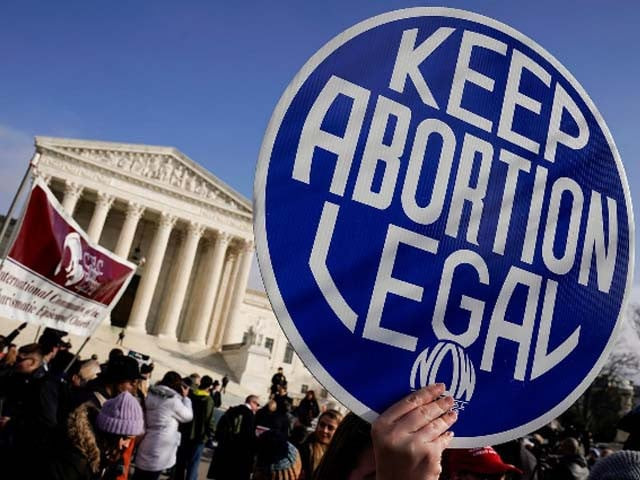Some interesting developments (or lack thereof) have surfaced about the abortion laws in the United States (US). Feminists who fought long and hard for a woman’s right to choose are turning in their graves after discovering that Justice Samuel Alito is considering overturning a landmark decision in the case of Roe v Wade, which sought to protect abortion rights in the US almost 50 years ago. An initial draft of the said move has been leaked. Even though this leaked draft is not the final verdict or opinion of the court, it has however sparked a serious wave of reactions and disappointment from abortion rights advocates. If the final call reflects the opinion draft, America will see a drastic shift regarding abortion rights in the country.
For anyone not already familiar with the original Roe v Wade, here is a quick description and a somewhat lengthy explanation about its significance for women’s rights. A landmark decision was taken in 1973 by the US Supreme Court that ruled that the Constitution of the US protected women’s liberty to choose to have an abortion without excessive government restrictions. This decision ultimately opened up safe spaces and clinics for women who wished to have abortions done, with services provided by fully trained and licensed physicians. The decision ultimately explained that the Due Process Clause of the 14th Amendment to the US Constitution provides “a right to privacy” which protects a pregnant woman’s rights to choose. Furthermore, the court reasoned those outlawing abortions would violate a pregnant woman’s right to privacy for reasons such as:
- having unwanted children would lead to a distressful life and future for the woman;
- it may cause long-term psychological harm which could result in poor care of the child considering the mother’s weak physical and mental health;
- and because there may be “distress, for all concerned, associated with the unwanted child”.
The decision was celebrated by abortion rights advocates as this was a huge move towards recognising women’s rights when it came to making their own choices about their bodies. And why shouldn’t it be? The benefits of legalised abortion are plentiful – fewer illegitimate births, smaller welfare costs, less children born as a result of rape. However, according to Alito, the constitution makes no such reference to abortion and that no such right is implicitly protected by the constitutional provision.
Therefore, the overturning of Roe v Wade would lead to stricter limits on abortion access largely in the South and Midwest, with about half of the states set to immediately enforce broad abortion bans. On the other hand, the following 16 states have laws in place to protect the right to abortion: California, Colorado, Connecticut, Delaware, the District of Columbia, Hawaii, Illinois, Maine, Maryland, Massachusetts, Nevada, New Jersey, New York, Rhode Island, Vermont and Washington.
Why this debate is causing such an uproar is not only because this is overall a huge setback for women’s right to choose what they want to do with their bodies but also the deep negative impact the ban will have (if implemented) on women who are prevented from obtaining abortions. Some of these adverse consequences include mental, physical and financial impacts. It has been proven in several studies that being denied an abortion is linked with an increase in anxiety, stress and lower self-esteem shortly after the denial. Women who are denied abortions also experience financial hardship, including an increase in household poverty considering there are additional mouths to feed and there are no strict laws around having the biological father provide child care support.
If abortion is to be banned and women’s bodies are to be controlled by a bunch of old white men, then perhaps they should also consider the consequences this will have on those very women, especially rape victims who have to carry the child of their abuser for nine months and then live with that trauma forever; while also being at risk of being contacted by the rapist for child custody or continued sexual violence and harassment. The ban would also greatly impact teenage mothers, sex workers and/or those women who become pregnant in cases of premarital and extramarital affairs. The fear of raising the child alone and being financially incapable of raising the child are of the top most reasons of pregnancy termination. Another very common reason for terminating a pregnancy is known as “young age pregnancy”, which ultimately would affect the young girl’s life negatively, while restricting her mobility and opportunities. Why is it that controlling women’s bodies and hindering their bodily autonomy is always up for debate, yet men’s accountability is hardly ever spoken about?
A better draft opinion to read about would’ve been the US Supreme Court leaning towards providing free vasectomies for men. It’s a fairly painless and reversible process which does not cause any kind of long-term psychological or physical ailments. If men who get women pregnant can ‘choose’ not be part of the raising process, they should be encouraged to undergo the medical procedure so as to not cause pregnancies at all. The procedure can be reversed if and when they decide to have children consensually with their partner. But of course, restricting men’s bodily autonomy would be of the utmost disgrace and disrespect.
According to Alito’s draft opinion, the idea that the abortion bans reflect the subjugation of women in American society is wrong considering women still have electoral and political power. By this logic, if women possess the right to vote or hold a public position, they should completely give up the right to decide what they want to do with their bodies because a few people who don’t even have a uterus can feel important about themselves. I wonder if these people who have decided to put these rights up for debates in the first place have even researched about the topic at all. It is actually quite obvious that despite the bans on abortions, they will continue to take place, only they will be unsafe and painful ones. Post-abortion care is essential for addressing disabilities caused by induced or self-induced abortions because they can surely be taken care of. However, the likelihood of women having access to post-abortion care and services will be practically zero in the states where the ban is to be implemented.
The US claims to be a superpower leading the world with its impeccable score on all fronts as a nation, but ironically their conservative ideas around minority rights have always remained questionable. These abortion laws are no different. Abortion is a reality, which is why it is essential that women be provided with affordable and easily accessible services without any pre-conceived notions and biases. The right to choose is a fundamental one and courts should challenge their abortion laws instead of executing bans that are only an attack on women’s freedom. If there is a ban which needs to be implemented immediately it is America’s gun laws which take more lives than abortions, with conviction rates of criminals at a disappointingly low rate, especially if the shooter is described as a white male. Pro-life advocates who are for the ban need to rethink their priorities and direct their energy into making more sensible arguments and fight for the justice of innocent children and adults who have been killed during school hours or in movie theatres by white American men who have the freedom to legally obtain a weapon over the counter, that too without a license or any understandable reason.
This is not about being pro-abortion, this is about being pro-choice, that no matter what your personal feelings or beliefs about abortion are, you understand it is not your place to make a decision for another woman about what she can and cannot do with her body.
To know where Pakistan stands on abortion laws, you can read my detailed piece here.



COMMENTS
Comments are moderated and generally will be posted if they are on-topic and not abusive.
For more information, please see our Comments FAQ